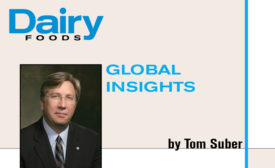Home » dairy exports
Articles Tagged with ''dairy exports''
U.S. dairy processors see fewer exports of their cheese and butterfat products. It’s a different story for milk powders, thanks to demand from Mexico and Asia.
Read More
2016 Exporter of the Year Swiss Valley Farms exports to 23 countries
The Iowa-based dairy cooperative invests in people and equipment to support cream cheese and whey powder exports.
November 4, 2016
Honors
Swiss Valley Farms is named the Dairy Foods 2016 Exporter of the Year
From its headquarters in Iowa, the dairy co-op exports to countries in the Americas, Asia, the Middle East, Africa and Oceania.
September 15, 2016
Trans-Pacific Partnership trade agreement a salve for Brexit uncertainty
The pending Trans-Pacific Partnership trade agreement could help the United States to ensure tighter ties to a less disrupted trade market.
September 9, 2016
U.S. dairy industry opposes WHO proposal to limit milk consumption by children
U.S. dairy processors and producers cannot ignore proposals by the United Nations, rules by the European Union and actions by our trading partners.
May 8, 2016
Powder play
USDEC’s forecast is that long-term global dairy growth remains strong
There is export potential for U.S. dairy processors, but the competition is tougher, according to the U.S. Dairy Export Council.
January 20, 2016
At home and abroad
U.S. dairy consumption helps to offset export declines in second quarter
Exports of butter to the Middle East are off; Japan, Saudi Arabia, Panama and Mexico cut back on their imports of U.S. cheeses.
August 25, 2015
Stay ahead of the curve. Unlock a dose of cutting-edge insights.
Receive our premium content directly to your inbox.
SIGN-UP TODAYCopyright ©2024. All Rights Reserved BNP Media.
Design, CMS, Hosting & Web Development :: ePublishing









